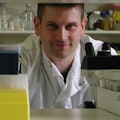Mechanisms of living systems

Technologies and approaches to uncover the ‘rules of life’ that drive all living system, from molecules to ecosystems.
This theme’s integral exploitation of informatic and engineering approaches leads naturally to strong links with colleagues from the College of Physical Sciences and Engineering. Furthermore, societal engagement is critical to realising the impact of our research, an objective that is significantly enhanced through close collaboration with partners in the College of Arts, Humanities and Social Sciences.
Sub-themes
The theme is focused in four inter-related sub themes.
Environmental solutions for a changing world
Global and local environmental challenges need interdisciplinary solutions.
Our research focuses on understanding underlying mechanisms to allow us to develop sustainable solutions that recognise the complex relationship between organisms and their environment. The objective is to ensure food security and conserve biodiversity by promoting ecosystems resilient to the changing world maintaining clean air, well-structured nutrient-rich soils and a sustainable water supply.
One Planet - One Health
One Health recognises the interconnected dependencies between humans, animals, plants and ecosystems. When considering common resources, such as water, that support our natural environment, agriculture and population, or when addressing the wicked problems that arise when developing sustainable places or dealing with Antimicrobial Resistance and Infection (CURE network), it becomes necessary to treat the environment as intimately linked to human health.
Systems and Predictive Biology
System approaches can be exploited in all areas of life science research, such as modelling disease states, epidemiology and environmental perturbations. To appropriately connect across scales, from molecule to ecosystem, there is a need to develop mathematical or computer models that allow us to predict the behavior of biological systems. Such models are critical to identify causative relationships and unravel underlying mechanisms, providing frameworks to generate and test conceptual hypotheses, as well as to design and predict manipulations of complex systems in order to achieve specific outcomes.
Innovative Technologies for Life
To drive biological research and to provide new solutions to biomedical and environmental problems, we develop novel quantitative transformative technologies, including novel bioimaging approaches, big data analytics, informatics, biosensors and diagnostics.
Theme lead

Professor Peter Kille
Director of Technology, Bio-Initiatives Director
- kille@cardiff.ac.uk
- +44 (0)29 2087 4507
